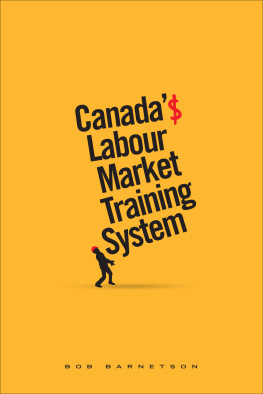DECOLONIZING EMPLOYMENT
ABORIGINAL INCLUSION IN CANADAS LABOUR MARKET
SHAUNA MACKINNON
University of Manitoba Press
Winnipeg, Manitoba
Canada R3T 2M5
uofmpress.ca
Shauna MacKinnon 2015
Printed in Canada
Text printed on chlorine-free, 100% post-consumer recycled paper
19 18 17 16 15 1 2 3 4 5
All rights reserved. No part of this publication may be reproduced or transmitted in any form or by any means, or stored in a database and retrieval system in Canada, without the prior written permission of the University of Manitoba Press, or, in the case of photocopying or any other reprographic copying, a licence from Access Copyright (Canadian Copyright Licensing Agency). For an Access Copyright licence, visit www.accesscopyright.ca, or call 1-800-893-5777.
Cover photo: Urban Circle Inc.
Cover design: Frank Reimer
Interior design: Karen Armstrong Graphic Design
Library and Archives Canada Cataloguing in Publication
MacKinnon, Shauna, 1961, author
Decolonizing employment : Aboriginal inclusion in Canadas labour market / Shauna MacKinnon.
Includes bibliographical references and index.
Issued in print and electronic formats. ISBN 978-0-88755-781-1 (pbk.)
ISBN 978-0-88755-467-4 (pdf )
ISBN 978-0-88755-465-0 (epub)
1. Native peoplesEmploymentCanadaCase studies. 2. Native peoplesCanadaEconomic conditions21st centuryCase studies. 3. Native peoplesCanadaSocial conditions21st centuryCase studies. 4. Native peoplesEmploymentManitobaCase studies. 5. Native peoplesEducationManitobaCase studies. 6. Native peoples ManitobaEconomic conditions21st centuryCase studies. 7. Native peoplesManitobaSocial conditions21st centuryCase studies. 8. Labor policyCanadaCase studies. 9. Labor policyManitoba Case studies. I. Title.
E98.E6M32 2015 331.6397071 C2015-903448-5 C2015-903449-3
This book has been published with the help of a grant from the Federation for the Humanities and Social Sciences, through the Awards to Scholarly Publications Program, using funds provided by the Social Sciences and Humanities Research Council of Canada.
The University of Manitoba Press gratefully acknowledges the financial support for its publication program provided by the Government of Canada through the Canada Book Fund, the Canada Council for the Arts, the Manitoba Department of Culture, Heritage, Tourism, the Manitoba Arts Council, and the Manitoba Book Publishing Tax Credit.
I dedicate this research to the courageous Aboriginal men and women who return to school as adults in spite of the many challenges and often very long road ahead. Inspired by their hopes and dreams for themselves and generations that follow, they work very hard to overcome obstacles that can seem insurmountable. Their bravery and perseverance within the context of damaging colonial policies, past and present, is nothing short of remarkable. I also dedicate this research to the many committed individuals I have come to know and respect, who work tirelessly with individuals, families, and communities in the inner city of Winnipeg to undo the damage of colonialism and the unjust social and economic policies that continue to exclude and marginalize.
Contents
Introduction
A discourse about social exclusion which focuses on integration through paid work tends to reduce the social to the economic, and simultaneously limits understanding of economic activity to market activity.
Levitas 2005, 26
In a capitalist economy, participation in the labour market is the primary means by which individuals meet their economic needs. Governments mediate labour supply and demand through a variety of policy measures. The manner in which governments intervene is particularly important for individuals experiencing weak labour market attachment, chronic unemployment, underemployment, and poverty. Labour market policies, including passive supports such as income replacement and active supports such as training, have an important role to play in societal efforts toward social and economic inclusion. However, labour market policies in the twenty-first century have become increasingly restrictive and disconnected from the needs of those most socially and economically marginalized. Aligned with neo-liberalism, labour market policies have become narrowly focused on short-term supply-side measures aimed at fast-tracking people into employment. This is problematic for a number of reasons that I describe in this book, but in particular because they disregard the reality that for those who have been chronically excluded from the labour market, neo-liberal policies are inconsistent with the long-term, comprehensive solutions that are often required.
Having worked for many years with marginalized populations, I became interested in the impact of policy changes emerging in the 1990s that seemed to be moving in a direction opposite from what was needed to support an equitable society. An ideological shift in policy and the use of short-term, narrowly focused, supply-side measures, evolving within the context of greater market freedom, was readily apparent. The values underlying neo-liberalism, once broadly rejected, seemed to be increasingly embraced by governments and increasingly reflected in a number of social and economic policies. In terms of labour market policy, there seemed to be no evidence that a market left to its own devices was creating high-skill opportunities and well-paying jobs. Instead, the evidence was showing an increasingly polarized labour market consisting of a relatively small and shrinking number of high-skilled, decent-paying, secure jobs in the primary market and a growing number of precarious jobs in the secondary market. For many workers, and in particular those most marginalized, primary-market jobs seemed to be nearly impossible to access. I was interested in learning more about the impact of current policy direction on those who were marginalized.
When we look closely at the situation in Manitoba, the statistics very clearly demonstrate that Aboriginal people continue to be overrepresented among those who measure poorly on a number of social and economic indicators. I wanted to understand how the neo-liberal approach to labour market policy was working for this population. Many Aboriginal adults take a different education pathreturning to their studies after having dropped out as adolescents. Government policy for these individuals is increasingly designed to push them through quickly. While quantifying employment and income outcomes was difficult because data was not consistently maintained, of the individuals interviewed, relatively few had proceeded on to well-paying jobs after completing brief training stints.
Much of what I expected to find, I found. However, I also discovered some things that I did not initially set out to find. I learned that even poorly funded, short-term programs can have an impact because of the commitment and creativity of program managers and staff. I learned from the men and women I interviewed in this study that positive outcomes come in different forms, and that success cannot always be objectively measured. While measuring in this manner can be useful, it tells a limited story and one based on Eurocentric capitalist values. Others means of measurement provide a way of understanding outcomes more broadly. These outcomes are more difficult to measure but, more importantly, they are often ignored. Failing to consider how participation in training programs can have an impact beyond the intended employment objective accepts narrowly defined measures of inclusion. At the same time, limiting access to short-term labour market training provides trainees a glimmer of what is possible yet not within their reach.









